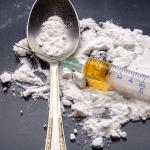Join Cameron English and Dr. Chuck Dinerstein on Episode 104 of the Science Dispatch podcast as they discuss:
drug abuse
Join Cameron English and Dr. Chuck Dinerstein on Episode 95 of the Science Dispatch podcast as they discuss:
The opioid epidemic has resulted in some soul-searching in the medical community.
How often do you hear of someone using their spouse’s antibiotic medication that was prescribed for a prior illness but not entirely if ever used? Or, a teen sharing her friend’s birth control pills?
A new report published in BMJ Journal: Injury Prevention opts to reframe how we interpret data on preventable, premature deaths by using an “en
In a trend described as “shocking,” news outlets are
The opioid epidemic is center stage when it comes to political agendas, media stories and national discussion.
The overdose epidemic sweeping the nation is hitting some demographics harder than others. New data released by the CDC breaks down heroin overdose deaths by age.










